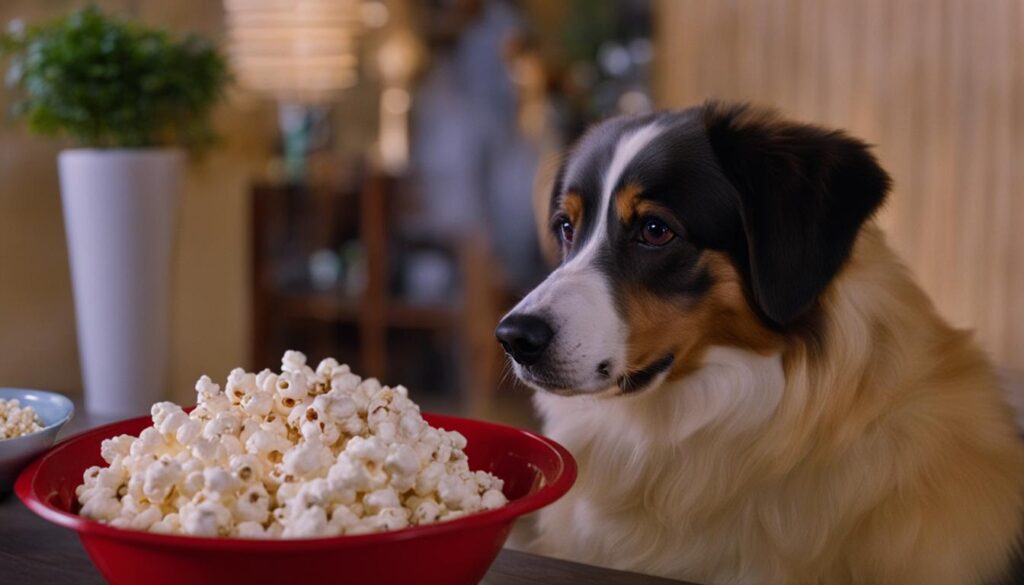Welcome to our article on whether dogs can indulge in everyone’s favorite movie snack – popcorn! As a responsible dog owner, it’s important to know what foods are safe for your furry friend to enjoy. So, let’s dig into the details and find out if popcorn is a safe and healthy treat for dogs.
Popcorn itself is not bad for dogs as it contains minerals, fiber, and trace amounts of vitamins. However, the toppings like butter, oil, and salt commonly added to popcorn can lead to intestinal upset and contribute to obesity-related health problems in dogs. Plain, air-popped popcorn can be a nice occasional treat for dogs, but it’s important to keep whole or partially popped kernels away from them to avoid choking hazards. It’s also crucial to limit the amount of popcorn as treats should only make up 10% or less of a dog’s daily caloric intake.
Key Takeaways:
- Popcorn itself is not harmful to dogs but beware of the toppings like butter and salt.
- Air-popped popcorn is the best option for dogs, avoiding any added seasonings or toppings.
- Popcorn kernels can pose a choking risk, so it’s important to remove any whole or partially popped kernels.
- Limit popcorn treats to 10% or less of your dog’s daily caloric intake.
- Consider alternative treats or consult with your veterinarian for safe and healthy snacking options.
Is Popcorn Safe for Dogs?
Popcorn is a popular snack for humans, but is it safe for dogs? While plain, air-popped popcorn can be a safe treat for dogs, there are some important considerations to keep in mind. It’s crucial to avoid buttered popcorn or popcorn with other toppings like salt or seasonings, as these can cause stomach issues for dogs. Microwave popcorn, in particular, can be high in salt and fats, which can be problematic for dogs with certain health conditions.
Dogs can tolerate small amounts of butter, but it’s always best to stick to plain, air-popped popcorn without any added ingredients. Additionally, popcorn kernels can pose a choking hazard, especially for smaller dogs. It’s important to keep whole or partially popped kernels away from dogs to prevent any potential accidents.
So, while dogs can enjoy plain, air-popped popcorn as an occasional treat, it’s important to moderate their intake and ensure their safety by avoiding toppings and popcorn kernels. Remember, if you have any concerns about your dog’s diet or if they have any underlying health conditions, it’s always best to consult with your veterinarian for personalized advice and guidance.
Table: Safe Popcorn Options for Dogs
| Safe to Feed Dogs | Not Safe to Feed Dogs |
|---|---|
| Plain, air-popped popcorn | Buttered popcorn |
| Popcorn without salt or seasonings | Popcorn with salt or other seasonings |
| Small amounts of melted butter | Microwave popcorn with added fats and salt |
| Popcorn kernels |

“While dogs can enjoy plain, air-popped popcorn as an occasional treat, it’s important to moderate their intake and ensure their safety by avoiding toppings and popcorn kernels.”
Providing safe and appropriate snacks for your furry friend is an essential part of being a responsible dog owner. While popcorn can be a tasty treat, there are also alternative options available. Homemade dog treats made with dog-friendly ingredients can provide a healthier and safer alternative to popcorn. There are many recipes available online that cater to different dietary needs and preferences.
If homemade treats aren’t your preference, there are also commercially available dog treats specifically formulated to be safe and nutritious for dogs. These treats come in a variety of flavors and sizes, making it easy to find options that your dog will love. Just remember to always check the ingredient list and consult with your veterinarian to ensure that any alternative treats you offer to your dog are suitable for their individual health requirements.
Benefits and Risks of Dogs Eating Popcorn
Popcorn, when consumed in moderation and without any toppings, can offer some benefits for dogs. It contains minerals and fiber that can contribute to their overall nutrition. However, it’s important to note that these nutrients can also be obtained from their regular diet if they are fed a complete and balanced dog food. Popcorn should be considered an occasional treat and not a staple in their diet.
While there are potential benefits, there are also risks associated with dogs eating popcorn. The toppings commonly added to popcorn, such as butter, oil, and salt, can lead to digestive issues and contribute to obesity-related health problems in dogs. These additives should be avoided when offering popcorn to your furry friend.
Additionally, popcorn kernels can pose a choking hazard to dogs, particularly smaller breeds. These kernels can get stuck in their teeth or throat, leading to discomfort or even a life-threatening situation. Therefore, it’s crucial to monitor your dog closely while they are enjoying popcorn and ensure that they do not have access to unpopped kernels.
The Importance of Dog Dental Health
In relation to popcorn, it’s worth noting that chewing on this crunchy snack can provide some dental benefits for dogs. The act of chewing helps to remove plaque and tartar buildup on their teeth, promoting better oral health. However, it’s essential to remember that popcorn can also get stuck in their teeth, requiring proper dental care and maintenance.
Regular teeth brushing, providing dental chews or toys, and scheduling professional dental cleanings with your veterinarian are all crucial for maintaining your dog’s dental health. While popcorn can contribute to their dental hygiene, it should not be the sole method of teeth cleaning.
To summarize, while plain, air-popped popcorn without any toppings can offer some nutritional benefits and contribute to your dog’s dental health, there are risks involved. The toppings and potential choking hazards from kernels should be avoided. It’s important to provide popcorn sparingly as a treat and prioritize their overall health by consulting with your veterinarian and considering alternative, dog-friendly snacks.
| Benefits of Popcorn for Dogs | Risks of Dogs Eating Popcorn |
|---|---|
|
|
Alternatives to Popcorn for Dogs
While popcorn can be a suitable occasional treat for dogs, there are other alternatives that may be healthier and safer. Homemade dog treats made with dog-friendly ingredients can be a great option. There are numerous recipes available online for homemade dog treats that can cater to your dog’s specific dietary needs. Additionally, there are commercially available dog treats specifically formulated to be safe and nutritious for dogs. It’s always important to consult with your veterinarian to ensure that any alternative treats you offer to your dog are suitable for their individual health requirements.
When it comes to homemade dog treats, the possibilities are endless. You can find recipes for treats made with ingredients like peanut butter, pumpkin, sweet potatoes, and even carrots. These treats can be baked or dehydrated to provide a crunchy texture that dogs love. Not only are homemade dog treats a healthier alternative to popcorn, but they also allow you to control the ingredients and avoid any potential allergens.
Commercially available dog treats are another convenient option. Look for treats that are made with high-quality ingredients and free from artificial preservatives, colors, and flavors. There are even treats specifically designed to support dental health, which can be a great addition to your dog’s daily routine. When choosing commercial treats, be sure to read the ingredient list and avoid any that contain unhealthy additives or fillers. Your veterinarian can provide recommendations on which brands and types of treats are best suited for your dog.
| Treat Type | Ingredients | Benefits |
|---|---|---|
| Homemade Dog Treats | Varies depending on recipe | Control over ingredients, customization to meet dietary needs |
| Commercial Dog Treats | High-quality ingredients | Convenient, specific formulations for dental health, variety of flavors |
Remember, treats should only make up a small portion of your dog’s overall diet. It’s important to balance treats with a nutritionally complete and balanced dog food. As with any new food or treat, introduce it gradually and monitor your dog for any adverse reactions. By offering alternative treats to popcorn, you can provide your furry friend with safe and healthy snacking options that they’ll wag their tail for.
Conclusion
All in all, when it comes to dogs and popcorn, it’s important to prioritize their safety and well-being. While plain, air-popped popcorn can be a nice occasional treat for your furry friend, it’s crucial to steer clear of buttered popcorn, popcorn with salt or other seasonings, and popcorn kernels. These can lead to digestive issues, obesity-related health problems, and potential choking hazards.
Remember, moderation is key. Monitor the amount of popcorn you give to your dog and ensure that treats make up no more than 10% of their daily caloric intake. It’s also essential to consider alternative snacks for your canine companion. Homemade dog treats made with dog-friendly ingredients or commercially available options specifically formulated for dogs can be healthier and safer choices.
Always consult with your veterinarian to ensure that the treats you offer to your dog are suitable for their individual health requirements. By taking these safe snacking tips into consideration, you can provide your four-legged friend with enjoyable treats while keeping them happy, healthy, and free from popcorn-related mishaps.
FAQ
Can dogs eat popcorn?
Yes, dogs can eat popcorn, but there are some important considerations to keep in mind. While plain, air-popped popcorn is safe in small quantities, it’s important to avoid buttered popcorn or popcorn with other toppings as they can cause stomach issues for dogs. Additionally, popcorn kernels can be a choking hazard, especially for smaller dogs.
Is popcorn safe for dogs?
Plain, air-popped popcorn can be safe for dogs to eat in small amounts. However, it’s crucial to avoid buttered popcorn or popcorn with other toppings as they can lead to digestive issues. Microwave popcorn, in particular, can be high in salt and fats, which can be problematic for dogs with certain health conditions.
What are the benefits and risks of dogs eating popcorn?
Popcorn itself can provide some nutritional benefits for dogs, as it contains minerals and fiber. However, these nutrients can also be obtained from their regular diet if they are fed a complete and balanced dog food. The risks of dogs eating popcorn lie in the toppings and potential choking hazards from kernels. Added butter, oil, and salt can lead to digestive issues and contribute to obesity-related health problems in dogs. Popcorn kernels can also get stuck in a dog’s teeth and pose a choking risk.
Are there alternatives to popcorn for dogs?
Yes, there are other alternatives that may be healthier and safer for dogs. Homemade dog treats made with dog-friendly ingredients can be a great option. There are numerous recipes available online for homemade dog treats that can cater to your dog’s specific dietary needs. Additionally, there are commercially available dog treats specifically formulated to be safe and nutritious for dogs. Always consult with your veterinarian to ensure any alternative treats you offer are suitable for your dog’s individual health requirements.





